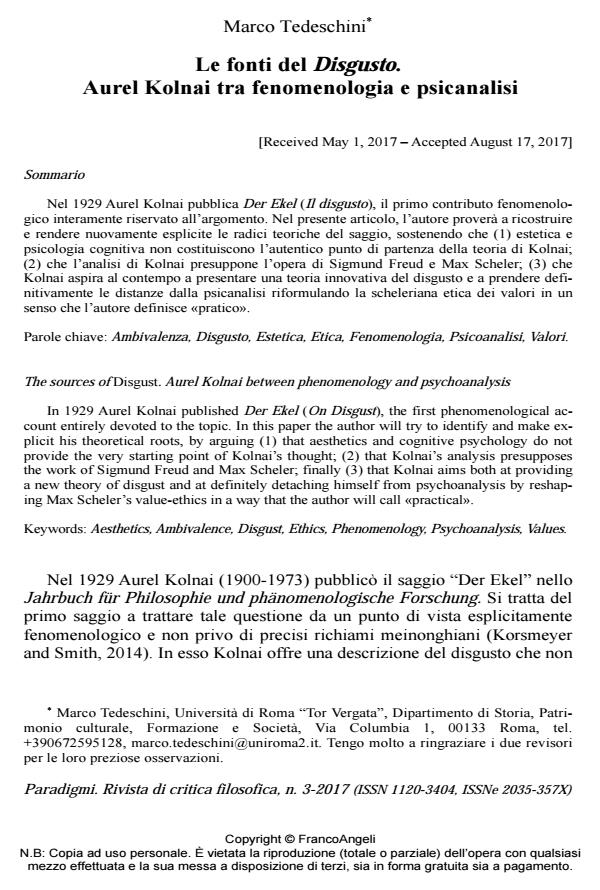Le fonti del Disgusto. Aurel Kolnai tra fenomenologia e psicanalisi
Titolo Rivista PARADIGMI
Autori/Curatori Marco Tedeschini
Anno di pubblicazione 2017 Fascicolo 2017/3 Lingua Italiano
Numero pagine 16 P. 105-120 Dimensione file 195 KB
DOI 10.3280/PARA2017-003008
Il DOI è il codice a barre della proprietà intellettuale: per saperne di più
clicca qui
Qui sotto puoi vedere in anteprima la prima pagina di questo articolo.
Se questo articolo ti interessa, lo puoi acquistare (e scaricare in formato pdf) seguendo le facili indicazioni per acquistare il download credit. Acquista Download Credits per scaricare questo Articolo in formato PDF

FrancoAngeli è membro della Publishers International Linking Association, Inc (PILA)associazione indipendente e non profit per facilitare (attraverso i servizi tecnologici implementati da CrossRef.org) l’accesso degli studiosi ai contenuti digitali nelle pubblicazioni professionali e scientifiche
Nel 1929 Aurel Kolnai pubblica Der Ekel (Il disgusto), il primo contributo fenomenologico interamente riservato all’argomento. Nel presente articolo, l’autore proverà a ricostruire e rendere nuovamente esplicite le radici teoriche del saggio, sostenendo che (1) estetica e psicologia cognitiva non costituiscono l’autentico punto di partenza della teoria di Kolnai; (2) che l’analisi di Kolnai presuppone l’opera di Sigmund Freud e Max Scheler; (3) che Kolnai aspira al contempo a presentare una teoria innovativa del disgusto e a prendere definitivamente le distanze dalla psicanalisi riformulando la scheleriana etica dei valori in un senso che l’autore definisce «pratico».;
Keywords:Ambivalenza, Disgusto, Estetica, Etica, Fenomenologia, Psicoanalisi, Valori.
- Bleuler E. (1914). Die Ambivalenz. In: Universität Zürich, hrsg. Festgabe zur Ein-weihung der Neubauten der Universität Zürich 18.IV.1914 (Festgabe der medi-zinischen Fakultät). Zürich: Schulthess & Co.: 95-106.
- Darwin C. (1872). The Expression of the Emotions in Man and Animals. London: John Murray.
- Dunlop F. (2002). The Life and Thought of Aurel Kolnai. Burlington: Ashgate.
- Dunlop F. (2004). Kolnai’s Dissertation Der ethische Wert und die Wirklichkeit. A “Completion” of Scheler’s Value-ethics. In: Bálázs Z. and Dunlop F., eds. Ex-ploring the World of Human Practice: Readings in and about Aurel Kolnai. Budapest-New York: Central European University Press: 268-280.
- Feloj S. (2017). Estetica del disgusto. Mendelssohn, Kant e i limiti della rappresentazione. Roma: Carocci.
- Franzini E. (2000). Tra gusto e disgusto. In: E. Franzini, a cura di. Gusto e disgusto. Milano: Nike: 11-82.
- Freud S. (1899). Die Traumdeutung. In: S. Freud. Gesammelte Werke, 2/3, Frankfurt a. M.: Fischer, 1966-69 (trad. it. L’interpretazione dei sogni. In: Opere 1899, Torino: Boringhieri, 1978).
- Freud S. (1913). Totem und Tabu. In: S. Freud. Gesammelte Werke, 9, Frankfurt a. M.: Fischer, 1966-69 (trad. it. Totem e tabù. In: Opere 1912-1914, Torino: Bo-ringhieri, 1977).
- Freud S. (1905, 19153). Drei Abhandlungen zur Sexualtheorie. In: S. Freud. Gesammelte Werke, 9, Frankfurt a. M.: Fischer, 1966-69 (trad. it. Tre saggi sulla teoria sessuale. In: Opere 1900-1905, Torino: Boringhieri, 1977: 443-546).
- Freud S. (1918a). Beiträge zur Psychologie des Liebeslebens. In: S. Freud. Sammlung kleiner Schriften zur Neurosenlehre. Vierte Folge. Wien: Heller: 200-251 (trad. it. Contributi alla psicologia della vita amorosa. In: Opere 1909-1912. Torino: Boringhieri, 1976).
- Freud S. (1918b). Aus der Geschichte einer infantilen Neurose. In: S. Freud. Sammlung kleiner Schriften zur Neurosenlehre. Vierte Folge. Wien: Heller: 578-717 (trad. it. Dalla storia di una nevrosi infantile. In: Opere 1912-1914, Torino: Boringhieri, 1977).
- Husserl E. (1987). Philosophie als strenge Wissenschaft (1911). In: E. Husserl. Husserliana (25). Aufsätze und Vorträge (1911-1921), hrsg. von T. Nenon und H. R. Sepp. Dordrecht: Nijhoff: 2-62.
- Kolnai A. (1920). Psychoanalyse und Soziologie. Zur Psychologie von Masse und Gesellschaft. Leipzig: Internationaler Psychoanalytischer Verlag.
- Kolnai A. (1923). Die geistesgeschichtliche Bedeutung der Psychoanalyse. Internationale Zeitschrift der Psychoanalyse, IX, 345-356.
- Kolnai A. (1925). Max Schelers Kritik und Würdigung der Freudschen Libidolehre. Imago. Zeitschrift für die Anwendung der Psychoanalyse auf die Geisteswis-senschaft, XI, 135-146.
- Kolnai A. (1927). Der ethische Wert und die Wirklichkeit. Freiburg i. B.: Herder.
- Kolnai A. (1929). Der Ekel. Jahrbuch für Philosophie und phänomenologische Forschung, X: 515-569 (trad. it. Il disgusto. Milano: Marinotti, 2017).
- Kolnai A. (1999). Political Memoirs, ed. by F. Murphy. Lanham-Boulder-New York-Oxford: Lexington Books.
- Korsmeyer C. and Smith B. (2004). Visceral Values: Aurel Kolnai on Disgust. In: A. Kolnai. On Disgust, ed. by B. Smith and C. Korsmeyer. Chicago-La Salle: Open Court: 1-25.
- Menninghaus W. (1999). Ekel. Theorie und Geschichte einer starken Empfindung. Frankfurt a. M.: Suhrkamp (trad. it. Disgusto. Teoria e storia di una sensazione forte. Milano: Mimesis, 2016).
- Radford R. (1999). Aurel Kolnai’s “Disgust”: A Source in the Art and Writing of Salvator Dalì. The Burlington Magazine, 140, 1150, 32-33.
- Scheler M. (1913). Das geschlechtliche Schamgefühl und seine Funktionen. Geschlecht und Gesellschaft, VIII, 3/4 e 5: 121-131; 177-190.
- Scheler M. (1954). Der Formalismus in der Ethik und die materiale Wertethik (1913-16), in Gesammelte Werke, II. Bonn: Bouvier (trad. it. Il formalismo nell’etica e l’etica materiale dei valori. Milano: Bompiani, 2013).
- Scheler M. (1973). Wesen und Formen der Sympathie (19131; ed. ampliata 1923). In: Wesen und Formen der Sympathie – Die deutsche Philosophie der Gegenwart, hrsg. von M.S. Frings. Bern-München: Francke Verlag: 7-257.
- Scheler M. (1986). Über Scham und Schamgefühl. In: Schriften aus dem Nachlass, I, Zur Ethik und Erkenntnislehre, in Gesammelte Werke, X. Bonn: Bouvier: 65-154.
- Smith B. (1994). Austrian Philosophy. The Legacy of Franz Brentano. Chicago and Lasalle, IL: Open Court.
- Talon-Hugon C. (2003). Goût et dégoût: l’art peut-il tout montrer? Nîmes: Éd. J. Chambon.
- Vendrell Ferran I. (2013). Aurel Kolnai: Fenomenología de los sentimientos hos-tiles. In: A. Kolnai, Asco, soberbia, odio. Fenomenología de los sentimientos hostiles, a cura di I. Vendrell Ferran. Madrid: Encuentro: 7-32.
Marco Tedeschini, Le fonti del Disgusto. Aurel Kolnai tra fenomenologia e psicanalisi in "PARADIGMI" 3/2017, pp 105-120, DOI: 10.3280/PARA2017-003008